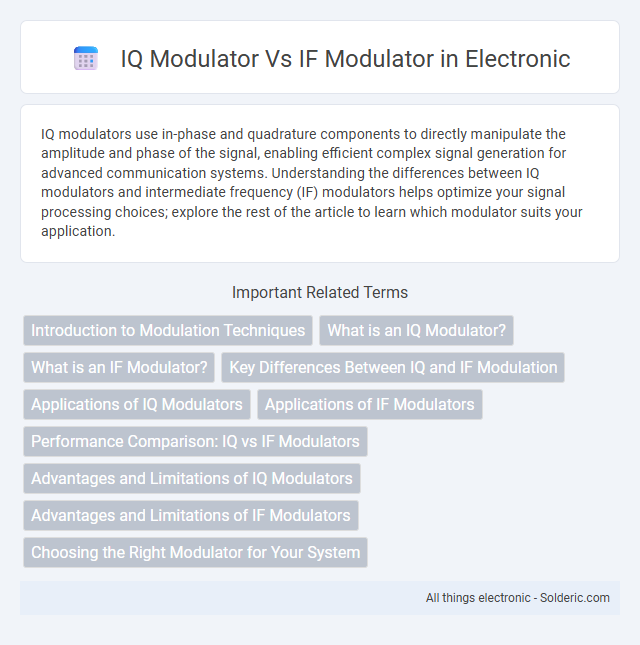IQ modulators use in-phase and quadrature components to directly manipulate the amplitude and phase of the signal, enabling efficient complex signal generation for advanced communication systems. Understanding the differences between IQ modulators and intermediate frequency (IF) modulators helps optimize your signal processing choices; explore the rest of the article to learn which modulator suits your application.
Comparison Table
| Feature | IQ Modulator | IF Modulator |
|---|---|---|
| Function | Modulates in-phase (I) and quadrature (Q) signals to produce complex RF outputs | Modulates at an intermediate frequency before upconversion to RF |
| Frequency Range | Direct RF modulation, typically up to several GHz | Intermediate frequency modulation, typically hundreds of MHz to a few GHz |
| Complexity | Higher complexity due to I/Q signal handling and calibration | Lower complexity, simpler architecture |
| Signal Quality | Better phase and amplitude accuracy, supports advanced modulation schemes | Potential for image frequency and distortion, requires careful filtering |
| Applications | Advanced wireless communication, software-defined radios, MIMO systems | Basic RF transceivers, legacy systems, simpler modulation formats |
| Cost | Generally higher due to complexity and performance | Lower cost, simpler components |
Introduction to Modulation Techniques
IQ modulators utilize in-phase (I) and quadrature (Q) components to encode amplitude and phase information simultaneously, enabling complex modulation formats like QAM and PSK for higher spectral efficiency. IF modulators operate on intermediate frequency signals, simplifying frequency translation and filtering before upconversion to the RF band. The choice between IQ and IF modulation techniques significantly impacts system complexity, linearity, and bandwidth utilization in communication transceivers.
What is an IQ Modulator?
An IQ modulator combines in-phase (I) and quadrature (Q) components to generate complex signals used in modern communication systems, enabling efficient modulation schemes like QAM and QPSK. Unlike an IF modulator that shifts baseband signals to an intermediate frequency, the IQ modulator directly manipulates amplitude and phase to produce more precise signal representation. Understanding an IQ modulator helps optimize Your signal processing for higher spectral efficiency and improved data rates.
What is an IF Modulator?
An IF modulator converts baseband signals into intermediate frequency (IF) signals used in communication systems, facilitating efficient signal processing and transmission. Unlike IQ modulators, which directly handle in-phase and quadrature components, IF modulators shift the signal to an intermediate frequency before further modulation or upconversion. Your choice between IF and IQ modulation depends on system requirements such as bandwidth, complexity, and frequency conversion stages.
Key Differences Between IQ and IF Modulation
IQ modulators process baseband signals by modulating in-phase (I) and quadrature (Q) components separately, enabling precise control of amplitude and phase for complex modulation schemes like QAM and PSK. In contrast, IF modulators shift the signal to an intermediate frequency by mixing a baseband signal with a local oscillator, suitable for simplified system architecture but with less direct control over phase modulation. IQ modulators offer superior spectral efficiency and flexibility in digital communication systems, while IF modulators are often used in traditional radio frequency applications demanding straightforward frequency translation.
Applications of IQ Modulators
IQ modulators are widely used in advanced communication systems, including quadrature amplitude modulation (QAM) for wireless networks and digital TV broadcasting, due to their ability to precisely control amplitude and phase of signals. They enable efficient generation of complex modulation formats in software-defined radios (SDRs) and satellite communication systems. IQ modulators also support high-speed fiber-optic communication by facilitating coherent detection and advanced multiplexing techniques.
Applications of IF Modulators
IF modulators are widely used in satellite communications, radar systems, and wireless transmitters due to their ability to handle high-frequency intermediate signals with improved linearity and reduced distortion. These modulators enhance signal quality in complex modulation schemes such as QAM and OFDM, making them crucial for modern digital communication systems. Their integration in phased array antennas and software-defined radios further exemplifies their versatility and importance in advanced signal processing applications.
Performance Comparison: IQ vs IF Modulators
IQ modulators provide superior performance in complex signal modulation by enabling separate control of in-phase (I) and quadrature (Q) components, resulting in enhanced signal fidelity and reduced distortion compared to IF modulators. IF modulators often introduce higher phase noise and limited bandwidth due to their single path modulation approach, impacting overall signal quality. The precise vector control in IQ modulators improves spectral efficiency and enables advanced modulation schemes like QAM, making them preferable in high-performance communication systems.
Advantages and Limitations of IQ Modulators
IQ modulators offer precise control over amplitude and phase, enabling superior signal quality and bandwidth efficiency compared to IF modulators. Their main advantage lies in direct baseband signal manipulation, reducing frequency conversion stages and associated distortion. However, IQ modulators can suffer from imbalance issues like IQ mismatch and LO leakage, which may require complex calibration to maintain optimal performance.
Advantages and Limitations of IF Modulators
IF modulators offer advantages such as simpler circuit design and reduced processing complexity by directly modulating signals at an intermediate frequency, which facilitates easier filtering and frequency conversion. However, limitations include vulnerability to image frequency interference and lower spectral purity compared to IQ modulators, which can result in less efficient bandwidth usage and increased signal distortion. The trade-off between implementation simplicity and signal quality makes IF modulators less suitable for high-performance applications requiring precise phase and amplitude control.
Choosing the Right Modulator for Your System
Selecting the appropriate modulator between IQ and IF depends on system requirements such as bandwidth, complexity, and linearity. IQ modulators excel in applications demanding precise phase and amplitude control, ideal for advanced communication systems with complex modulation schemes. IF modulators simplify the design for systems targeting narrower bandwidths and lower frequencies, offering cost-effective solutions with easier integration and reduced local oscillator leakage.
IQ modulator vs IF modulator Infographic

 solderic.com
solderic.com